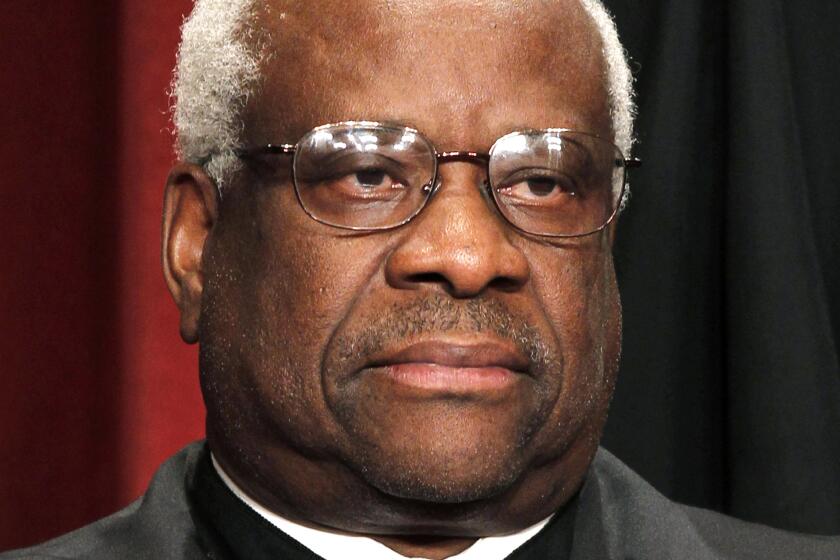Californians disapprove of Supreme Court’s work by a 2-1 ratio

- Share via
WASHINGTON — California voters by a 2-1 ratio disapprove of the work of the U.S. Supreme Court, describing it as too conservative and its rulings driven by politics, according to a new UC Berkeley Institute of Governmental Studies poll co-sponsored by The Times.
The statewide survey taken online last month found a sharp divide based on the voter’s party identification.
Overall, 29% those surveyed said they approved of the court’s work while 59% disapproved. But Republicans leaned in the opposite direction. Some 59% of those who identify as Republicans said they approved of the court, while only 30% disapproved.
By contrast, Democrats and supporters of President Biden were opposed and strongly so. Only 13% of Democrats said they approved of the high court and 78% disapproved. Moreover, 53% said they “strongly disapproved” of the court.
Biden and Trump voters from 2020 were asked whether the court is too conservative. Yes, said 76% of Biden voters. Only 7% of Trump voters agreed.
The California poll results are in line with similar national polls taken in the last year, and they reflect the Supreme Court’s shift to the right after the arrival of President Trump’s three appointees.
In the last two years, the court has struck down the constitutional right to abortion and college affirmative action policies, expanded gun rights, sharply limited climate change regulations and rejected Biden’s plan to forgive millions of student loans.
In all of those rulings, the court’s conservative Republican appointees were in the majority while its three liberal Democratic appointees dissented.
It’s a conservative Supreme Court, but not quite as predictably so this year, as several surprise rulings have shown.
By a wide margin, the California voters surveyed said they felt the court’s rulings were based more on politics than law.
Overall, 66% said the rulings were “guided more by the personal political leanings of the justices” while 23% said they were “guided more by the law and the Constitution.”
Many but not most Republicans agreed. While 50% said they believed the rulings were based on the law, 41% said they were reflected the personal political leanings of the justices.
By a similarly wide margin, the state’s voters agreed with Democrats in Congress that the high court needs an enforceable code of ethics.
Seventy-one percent of those surveyed said the justices need “an enforceable code of ethics.” Some 87% of the Democrats agreed, as did 48% of Republicans.
Since April, ProPublica, a nonprofit investigative group, has reported on a series of lavish, free and undisclosed vacation trips that Justice Clarence Thomas and his wife, Ginni, took with Texas billionaire Harlan Crow.
Thomas said he had viewed the trips as “personal hospitality” provided by a longtime friend, which need not be disclosed. But earlier this year, judicial authorities revised the guidelines to make clear that private plane trips are not covered by the “personal hospitality” exemption and must be disclosed.
A 2004 Los Angeles Times report disclosed gifts to Justice Thomas from rich Texan Harlan Crow. In response, Thomas stopped disclosing them.
Justice Samuel A. Alito Jr. was also the target of criticism for taking a 2008 fishing trip to Alaska that was paid in part by Paul Singer, a hedge fund billionaire who later won a major ruling at the high court in an Argentine bankruptcy case. Alito did not disclose the trip and did not recuse himself from the case.
Last week, Alito said he would not withdraw from an upcoming case on whether some investments and accumulated wealth may be taxed as though it were income.
Sen. Richard J. Durbin (D-Ill.), chairman of the Senate Judiciary Committee, said Alito should recuse himself because he sat for a Wall Street Journal article that was conducted by an editorial writer along with Washington attorney David Rivkin, who writes frequent opinion articles. Rivkin is also one of the lawyers for the family in the tax case of Moore vs. U.S.
Alito said justices must decide for themselves whether to withdraw from pending cases, and he said he was confident he could decide the legal question impartially based on the law and the Constitution.
Although political partisans are divided in their views of the court’s work, the poll results do not show a clear split based on the race or ethnicity of the respondents. There were, however, differences based on gender, education and household income.
More women — 64% — disapproved of the court’s work, compared with 55% of men. While 57% of high school graduates disapproved of the court, that percentage rose to 64% among college graduates and 67% among those with a postgraduate education.
When asked whether the court was too conservative, only 44% of those with incomes below $40,000 said yes, but that percentage rose to 64% among those with incomes of more than $200,000 a year.
The poll was administered online in English and Spanish on Aug. 24-29 among 6,030 California registered voters.
More to Read
Get the L.A. Times Politics newsletter
Deeply reported insights into legislation, politics and policy from Sacramento, Washington and beyond. In your inbox twice per week.
You may occasionally receive promotional content from the Los Angeles Times.













